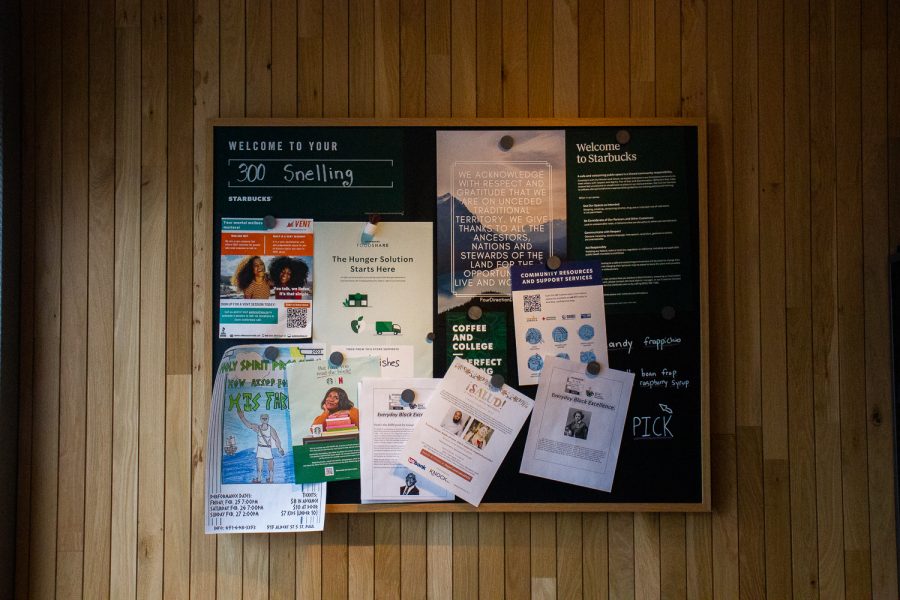Starbucks workers begin unionization effort
February 18, 2022
On Feb. 11, the workers at Starbucks on the corner of Snelling and Stanford Avenues announced their intention to form a union.
“We are organizing a union in our store because it is the most effective way for us to ensure accountability and that we are heard,” a letter addressed to the Starbucks CEO read.
The employees (or ‘partners,’ as Starbucks officially calls them) announced their unionization effort along with another store in Minneapolis.
The two Minnesota stores join a nationwide surge of unionization. Last December, a Starbucks store in Buffalo, N.Y. became the first ever Starbucks in the nation to have a unionized staff. Currently, there are over 80 stores in the country involved in union organizing.
Starbucks keeps two open seats in their corporate meetings, one symbolizing customers and the other symbolizing the employees. Now, the employees want the symbolic seat to actually reflect their voices.
According to Max Chang ’22, a barista at the St. Paul location, the primary motivation behind forming the union is to have a bigger say in the company’s decision-making.
“We want a bigger voice in the policy changes, we want that seat at the table. We want direct communication with the higher-ups, and better communication,” Chang said. “We’re the ones on the floor all day, we’re the ones interacting with customers and we have really valuable input that comes from everyday experience that doesn’t necessarily get translated to policy changes.”
Although the initial demands of the union centered around communication and increased representation in decision-making, the union will also push for better COVID-19 policies. According to Lola Rubens, a barista at the St. Paul store who’s been working there for seven months, Starbucks’ response to the pandemic has changed drastically over time.
“In the initial wave, they shut down stores for a couple of weeks,” Rubens said. “They were really big on prioritizing partner health over profit and business, they let people take time off, they still paid them and then when they came back, cafes were closed [and] everybody had to wear masks.”
However, this strong response faded over time.
“Now, during the most recent wave of Omicron where numbers peaked higher than they ever did, we saw none of that,” Rubens said. “The only support that is offered to partners is isolation pay, so if you contract COVID or you’re exposed and you have to isolate, then they will still pay for some money.”
The St. Paul store is licensed by the Minnesota Department of Health, rather than the city of St. Paul, so they were not required to comply with St. Paul’s vaccination card requirement, which was lifted last week. The company decided not to comply with the requirement against its employees’ demands.
“Starbucks as a company decided we were not going to comply with those mandates, despite significant partner pushback and partners voting in favor of having vaccination cards,” Rubens said.
The employees demand more say in how these policies are implemented.
“Ultimately what we’re working for is to have a guaranteed voice in the decisions that are going to affect us,” Rubens said.
Beyond these initial expectations, the union will also advocate for increased wages and benefits. Throughout the pandemic, the employees did not see the record profits the company brought in last year reflected in their wages.
“We will be demanding improved benefits and better wages, especially given the fact that Starbucks brought in tens of billions of dollars over the pandemic, [while] our pay has barely changed,” Chang said.
The company refused to acknowledge the union, so the organizers are preparing for elections. Still, Starbucks has a reputation for anti-union activity. Last week, the company fired seven employees in Memphis, Tenn., that were involved in organizing, citing alleged safety and security violations.
The workers at the St. Paul store are preparing for retaliation.
“We know what the rules are, we will know when Starbucks crosses the line with union busting and we have the resources to make sure we’re supported if that does happen,” Chang said. “We’re training ourselves to be prepared.”














